Are you wondering what 2017 might look like for Facebook marketing?
If the Facebook changes in 2016 are an indicator, 2017 will be an interesting year for Facebook marketers.
To get a grip on what the near future may look like, we tapped the knowledge of 19 social media pros.
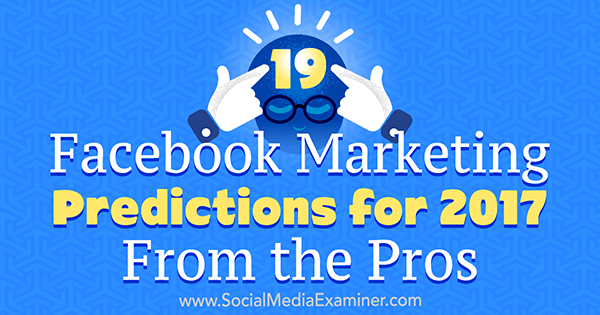
#1: Paid Ads Come to Facebook Groups

I think Facebook will reduce the reach that Facebook groups get and introduce paid ads for groups. I rarely interact with pages and quite often interact with groups. As we move away from pages toward groups, Facebook will reduce the reach. It's a perfect opportunity for Facebook to grow an additional advertising revenue stream.
Ian Cleary is the founder of RazorSocial, one of the world's leading marketing technology sites focused on social media and content marketing.
#2: Facebook Launches Messenger Video Stories That Publish to News Feed

The release of Snapchat-like functionality in Messenger demonstrates that Mark Zuckerberg is taking Snapchat seriously. These tools allow users to embellish videos and images with drawings, filters, and text and are currently available only as direct messages to individuals, although that will change.
In 2017, Facebook will allow Snapchat-like stories to be created in Messenger and then posted as videos to a personal or page feed.
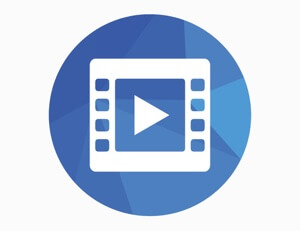
Their tools for live video continue to evolve as well. With scheduled live videos, broadcasting from desktop, and trimming finished videos for better replays all slowly rolling out, this is just a step toward Facebook's overall video strategy.
Expect to see more studio editing and post-production tools offered to Facebook Live users with the app and on desktop. Facebook's goal is to provide content creators with the tools they need to create professional and polished content that will receive many replays.
In addition, I expect Facebook Live to start appearing on Smart TVs next to Netflix, Amazon Prime, and Hulu, as Facebook intends to position itself as a broadcast network.
Joel Comm is a live video expert.
#3: Facebook Develops End-to-end Sales Communication Tools for Messenger

Consumers now expect almost immediate communication with companies, and those who are willing to provide it will get the sale.
Get World-Class Marketing Training — All Year Long!
Are you facing doubt, uncertainty, or overwhelm? The Social Media Marketing Society can help.
Each month, you’ll receive training from trusted marketing experts, covering everything from AI to organic social marketing. When you join, you’ll also get immediate access to:
- A library of 100+ marketing trainings
- A community of like-minded marketers
- Monthly online community meetups
- Relevant news and trends updates
For example, I just signed a new apartment lease and guess what? All of my communication (setting up a tour to asking questions about amenities to signing the lease) was done through Facebook Messenger.
In 2017, Facebook will continue to develop and release products that facilitate the (almost) instant communication consumers are beginning to expect. The release of Facebook Messenger ads last November was just the beginning of the evolution.
Not only can these conversations be inexpensive to acquire, they also progress quickly because of the instantaneous nature of chat versus phone or email.
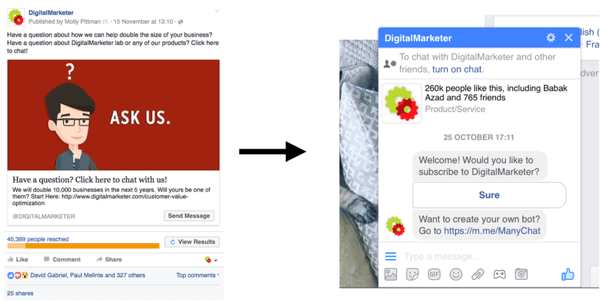
Marketers who invest their time and human resources into educating prospects on these new touchpoints and overcoming their objections will be the ones who win.
Molly Pittman, VP of marketing at DigitalMarketer.com and host of the Perpetual Traffic podcast, is a leading expert on Facebook advertising and all things customer acquisition.
#4: Facebook Launches Its Own Cable TV Network

With a news feed that's nearly maxed out, Facebook will need to diversify into new media, much like Google has in recent years. Facebook has already indicated it will be introducing original programming on Facebook Live. All this is a setup for a much bigger media play.
I believe that Facebook will either purchase a major television network or start one of its own from scratch. They'll target a high-profit niche like sports or consumer goods.

If there was a Facebook channel on your TV, would you watch it?
Mike Stelzner is the founder and CEO of Social Media Examiner, founder of the Social Media Marketing Society, and author of the books Launch and Writing White Papers.
#5: Facebook Chatbots Centralize Sales and Customer Service

More than one billion people are using Facebook's Messenger every month, and my prediction is that Messenger bots will become a central part of customer service and sales processes.
Bots and AIs have typically performed a customer service role, answering queries and directing users toward helpful contacts and resources. Now they're also used to facilitate or even initiate sales conversations.
In the near future, fans will only need to send a Facebook message on a company page to complete their purchase. For example, KLM Airlines uses a bot to help you book your flight, Fynd's bot helps you buy clothes, and CNN's bot gives you the latest news.
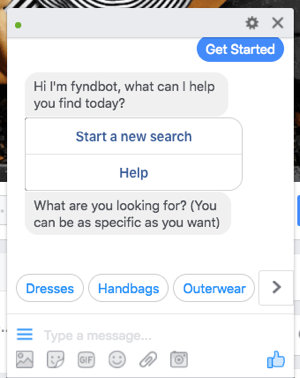
Marketers should try to inform themselves about all that Facebook Messenger bots have to offer, and how to include bots in their customer service and sales strategy.
Furthermore, businesses should start convincing their fans to send them Facebook messages. As soon as contact is made, businesses are able to contact those people back at any time, and as often as they want. It's similar to an email opt-in on a landing page, but the chance of someone reading a Facebook message is much higher than for opening a sales email.
To jumpstart the messaging process, brands should add a Message Us on Facebook button to their website or at least the contact page.
Alex Khan is CEO and founder of Attractive Media, a social and digital marketing agency based in Germany.
#6: Facebook Live Embraces Advanced Third-party Tools

Facebook Live is about to grow up. More advanced third-party tools will evolve to improve the quality of shows, integrate marketing functionality such as calls to action, and allow better community engagement opportunities.
Additionally, Facebook has announced that monetization of live video is coming! This means ads will be integrated into live video just as they are on YouTube, giving marketers an opportunity to monetize streams.
Kim Garst, co-founder and CEO of Boom!, is a bestselling author of Will the Real You Please Stand Up: Show Up, Be Authentic and Prosper in Social Media.
#7: Facebook Ad Targeting Deepens

Facebook advertising is going to get increasingly granular with regard to whom you can target and retarget on Facebook.
Take for example the new Engagement feature for Facebook custom audiences. Using this feature, you'll be able to target people who've interacted with your page in any way, or in a specific way, over the past 365 days.
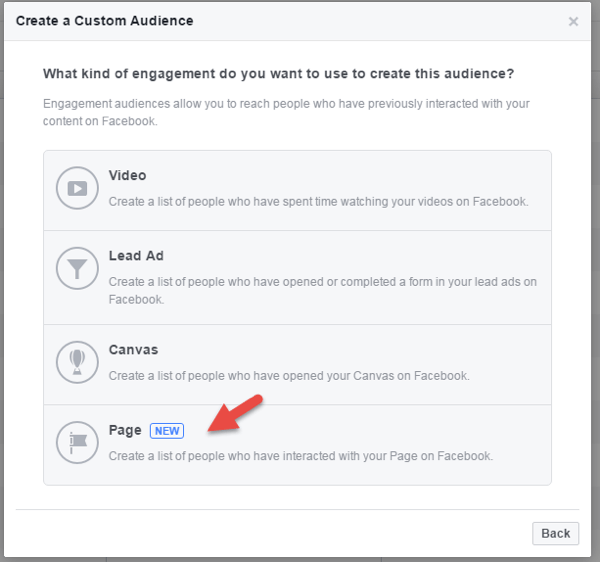
The granular segments help you save money by delivering a specific message to only those who are already familiar with your brand.
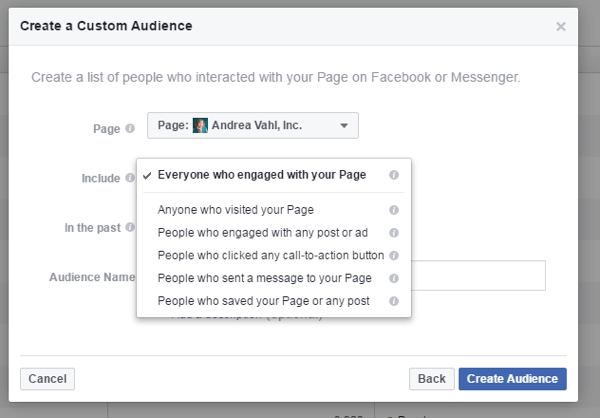
As Facebook continues to lead social media sites in terms of advertising features, businesses that know how to use these features effectively will benefit with lower advertising costs and better ROI. Marketers can adapt to the changing advertising landscape on Facebook by:
- Making sure they're tracking their conversions with Facebook pixels and optimizing their ads around their true goals.
- Testing different techniques.
- Watching the keywords and types of ads that work for them.
Andrea Vahl is a social media coach, speaker, and strategist and is co-author of Facebook Marketing All-in-One for Dummies.
#8: Facebook Video Analytics Become Crucial

In 2017, we'll see marketers demand greater transparency around their Facebook video and live video analytics.
With more brands paying to advertise, produce, and distribute video, it's time for platforms, agencies, publishers, and influencers alike to start sharing more data.
Nick Cicero is the founder and CEO of Delmondo, a creative studio and video analytics company working with brands like L'Oreal, Red Bull, MTV, AT&T, and Lowe's to produce and measure content on Snapchat and Facebook Live.
#9: Facebook Improves Workplace Tools, Extends Search

In 2016, Facebook and Google dominated 75% to 85% of the digital media advertising market. Furthermore, Facebook is positioned to be WPP's second largest media supplier in 2017 (after Google) according to CEO Martin Sorrell.
To increase its profitable revenues, Facebook will look beyond increased video consumption in 2017. Specifically, Facebook will:

- Improve direct-to-purchase functionality. This will help it more effectively compete against Google and Amazon.
- Expand and enhance its workplace tools and functionality. This would help Facebook build the B2B side of their advertising business since roughly a third of workers use social media for a mental break.
- Extend search functionality beyond people and places.
Heidi Cohen is the chief content officer of Actionable Marketing Guide, where she provides marketing insights on social media, content marketing, and mobile.
#10: Facebook Influencer Campaigns Mature

I think there will be a change in the way brands and influencers partner on Facebook. True brand ambassadorship will emerge and it will be seamless and transparent.
Brands will be able to create meaningful and helpful content alongside their biggest fans and advocates. As a result, audiences will have better and more choices because they'll be better informed.
Marketers can adapt by choosing their influencers carefully and going niche: the “spray and pray” method of advertising is dying and talking directly to your customer is going to become necessary.
Jessica Kupferman, CEO of j/k media agency, the co-host and co-founder of the She Podcasts brand, and host of Lady Business Radio, has worked with small businesses and large companies including Comcast, Subaru, and Bank of America.
#11: Facebook Live Technologies Improve Broadcasts

Facebook is investing heavily in getting people to use Facebook Live. As a result, there is (and will continue to be) a lot of noise there. Since Facebook Live is getting preferential treatment in the news feed, marketers will continue using it in increasing numbers.

Discover Proven Marketing Strategies and Tips
Want to go even deeper with your marketing? Check out the Social Media Marketing Podcast! Publishing weekly since 2012, the Social Media Marketing Podcast helps you navigate the constantly changing marketing jungle, with expert interviews from marketing pros.
But don’t let the name fool you. This show is about a lot more than just social media marketing. With over 600 episodes and millions of downloads each year, this show has been a trusted source for marketers for well over a decade.
The problem is that most Facebook Live sessions aren't goal-oriented, don't provide value, and add more noise to an already noisy news feed. Facebook users will get tired of this quickly.
However, this provides a golden opportunity for smart marketers who tell engaging stories, provide lots of value, and create engaging live experiences for their audiences.
In addition, new technologies will allow marketers to create live shows that are on par with what many professional news organizations have been doing for years.
The marketers who win will be those who strike a balance between creating a professional production and being approachable to their audience. These marketers will be the breakout stars in 2017.
Leslie Samuel, owner of Become A Blogger and host of the Learning With Leslie podcast, is the head of training for the Social Media Marketing Society.
#12: Facebook Live Video Improves Brand Discoverability

Discovery in online media is difficult to achieve. Last year, however, Facebook pulled off something magical — and most marketers missed it. They brought “discovery” to online audio/video and with an audience of nearly 2 billion people.
I recently watched a client go live on Facebook one day. Within an hour, he had 87,000+ people watching his stream. Was it an ad campaign that brought them there? Was it a mass mailing? What social voodoo made it possible? He asked the audience to like and comment on the video. These likes showed up in the streams of their friends and the power of social brought them en masse to his stream.
It was almost scary how easy it was.
Great video content, streamed on Facebook, provides a discovery opportunity that no other platform could dream of. Producing live content for an audience that wants to consume it is the most powerful marketing opportunity in 2017. Discovery is back and smart marketers will leverage it.
Paul Colligan is author of How to Stream Video Live.
#13: Facebook's Video is Monetized

In 2017, Facebook is going to — you guessed it! — reward more video.
More video equals more reach. More reach equals more engagement. More engagement equals brand loyalists. Brand loyalty equals more money. And we all live in a capitalist economy where more money is a good thing.

Facebook looks to be moving toward a video-first position, which means you can expect video monetization and major improvements in how those videos are delivered to your friends, fans, and followers in 2017. But they aren't just banking on video — and neither should you.
We also expect to see more artificial intelligence through Facebook Messenger. Any organization that works in hospitality, retail, fashion, or consumer packaged goods should look to using Facebook Messenger chatbots this year.
And last but certainly not least, Facebook will continue to expand their Shop section, which will allow you to sell directly from Facebook. I don't really love Facebook owning all of our data like that, but it does give us a second platform from which to sell. And more money…well, see above.
Gini Dietrich is founder and CEO of Arment Dietrich, author of Spin Sucks, co-author of Marketing in the Round, and co-host of Inside PR.
#14: Facebook Group Use Declines in Favor of Workplace

We're going to see people moving away from using Facebook groups for their online community in 2017.
Having remained untouched for a while, the Facebook news feed algorithm is now in full effect inside groups, meaning questions and member contributions are more easily missed and harder for group admins to keep a handle on.
Couple this with the fact that Facebook is currently testing out ads in Groups, and the drawbacks of using the already limited Group functionality starts to massively outweigh the benefits.
At the same time, the options for self-hosting your own online community or discussion forum have become more accessible and infused with the social features that people have become accustomed to, such as user tagging, likes for content, status updates, and user profiles.
Smart marketers should be building on their own turf, where they have control of the platform and the data; the changes coming to Groups this year will hopefully be the final shove to encourage them to do so.
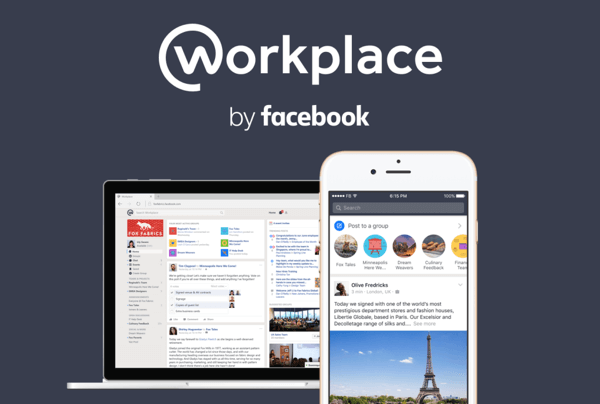
While Facebook Workplace is still invite-only, I do think that by the end of the year we'll have a few notable brands using Workplace to create a community rather than just as an internal company tool.
Mike Morrison is half of The Membership Guys and helps run the Member Site Academy.
#15: Facebook Live Prep Key to Strategic Success

While social media has always offered the chance for fans to become more engaged with businesses and brands they love (and become more loyal as a result), Facebook Live now makes it possible to experience engagement on a whole new level.
However, as more businesses leverage this tool, it's becoming more difficult to have a live broadcast that stands out from the rest. My 2017 prediction is that for Facebook Live feeds to be successful, hosts need to be strategically prepared. Having a checklist ensures you're prepared and have done everything you can for a successful broadcast.
In addition, remember that perfection doesn't exist in the online streaming world. Instead of perfection, try for clarity of message and approachability. Viewers aren't expecting to see a Broadway actor recite a powerful monologue. They tune in with the expectation that your Facebook Live chat is just that, a chat.
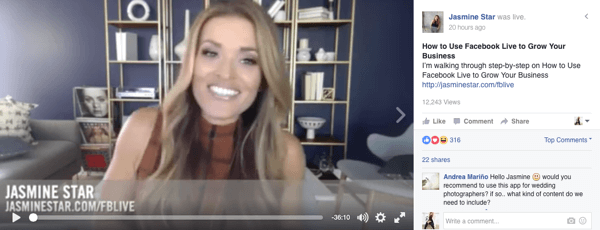
Gone are the days of flippantly curated live broadcasts. It's time to play hardball!
As we move into 2017, it's key to use Facebook Live as an integral part of your marketing, but more importantly to use it strategically to stand out from the quickly saturating news feed. Revel in the value of showcasing who you are, not just what you do.
Jasmine Star, an internationally recognized photographer, empowers entrepreneurs to build a brand and market it on social media.
#16: Facebook Positions for a Camera-first User Experience

“I want to start by talking about our work around putting video first across our apps,” said Mark Zuckerberg at the top of the third-quarter earnings call with analysts in November 2016. “Soon, we believe a camera will be the main way that we share,” he added.
Yes, Facebook plans to put a camera, not a text box, at the center of the user experience. “Soon” might not mean 2017, but one thing is for sure: publishers had better start thinking and acting like video producers. Videos just might become the only way to pause those quick fingers scrolling through the news feed.
Ana Hoffman blogs at Traffic Generation Café, where she serves her readers free traffic generation strategies like SEO, social media, blogging, and other Internet marketing methods.
#17: Facebook Pushes 360 & AR/MR Content

Facebook will continue to push for live video to become mainstream among its users worldwide, but most importantly they'll roll out live 360-degree video to everyone. More people will start sharing their photos and videos in 360 on Facebook.
The company will launch a social VR app or an addition to what they already offer, further pushing users toward VR as this technology starts to become somewhat more affordable and more widely used for fun and business.

There will also be a push toward augmented reality/mixed reality and Facebook won't stay far behind Snap's Spectacles. Expect some AR/MR glasses from Facebook at some point, be it either from them or from a partnership with MR hardware manufacturers like ODG.
It'll be crucial for marketers to understand VR/AR better as we move away from creating content in 2D toward content that's fully immersive, sometimes in 360 and sometimes augmented digitally.
Cathy Hackl, a nationally recognized live video and VR/AR influencer and speaker, is one of the nation's top Latino digital influencers and tech innovators.
#18: Third-party Facebook Live Tools Evolve

As Facebook Live becomes easier and more mainstream, marketers will need to focus on higher quality with more professional broadcasts.
There's no question that Facebook is pushing their live video platform hard this year. Many cities around the world are plastered with ads for Facebook Live. As well as broadcasting from your smartphone, Facebook has rolled out to many the ability to broadcast from your desktop through the Facebook website.
It's a lot easier to broadcast live, but already some are being overwhelmed by the sheer number of Facebook Live broadcasts. Not all are of the highest quality!
Live video is still a powerful means of communicating with your audience in a real and authentic way – allowing people to have access to you and ask questions. However, marketers are going to have to get smart to stay ahead of the curve and communicate effectively with their audience.
This could involve using broadcasting tools such as OBS Studio or Wirecast to broadcast to Facebook Live.
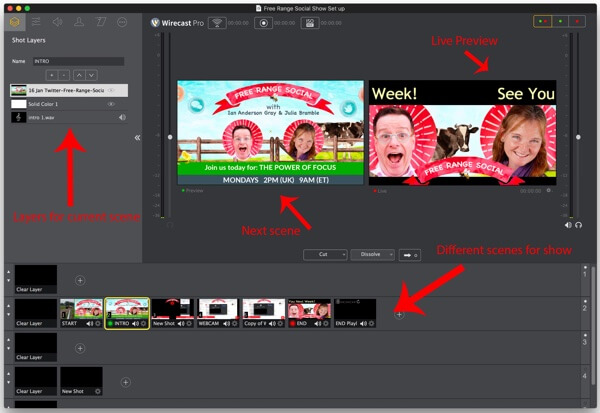
This will allow marketers to:
• Use their own branding including watermarks and lower third graphics.
• Interview guests and share their screens.
• Produce webinars and how-to videos.
• Broadcast live events with higher-quality audio.
• Use emerging technologies such as Facebook Live 360 and Facebook Live Audio.
Ian Anderson Gray is founder of Seriously Social, a blog focused on social media tools.
#19: Facebook Expands Customer Service Features

In 2017, I predict Facebook will move big into the social customer service space through two important mechanisms: Facebook Messenger and ratings/reviews.
By providing tools that make it easy for businesses and consumers to connect in real time (Messenger), they create value for both parties. That value can help mitigate bad customer service situations by giving businesses a rapid-response way to right the ship.
This is an area that Facebook has already invested in, and businesses have responded positively to the opportunity to reach consumers in real time and even automate some routine customer interactions via chatbots. For the consumer, this is a real win. It delivers solutions to problems they want quickly solved and on the social channels where they already spend time.
The second move I predict Facebook will make is into the ratings-and-reviews space. Today Facebook hosts ratings and reviews for businesses but the platform doesn't yet sufficiently differentiate from other similar services on the Internet like Yelp.
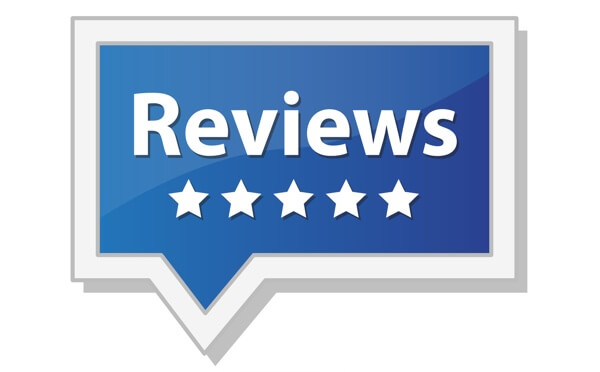
As the platform continues to further expand its local search credentials, it will develop a more intuitive, trustworthy, and dependable ratings-and-reviews service that has real potential to disrupt Yelp's presence in the market, particularly among small businesses. Facebook will do this by mining its deep knowledge of its user data, providing a mechanism to check the authenticity and veracity of specific review content.
Because of Facebook's expansive reach, all of these tools will capture rapid market adoption by both consumers and businesses. This may finally solve the current crisis with ratings-and-reviews content: trustworthiness.
Daniel Lemin is the bestselling author of Manipurated, a detailed guide to the online reviews industry, as well as the head of the Convince & Convert consulting group.
What do you think? Which of these predictions is most interesting to you? How do you expect Facebook marketing to evolve in the coming months? Share your thoughts in the comments below.
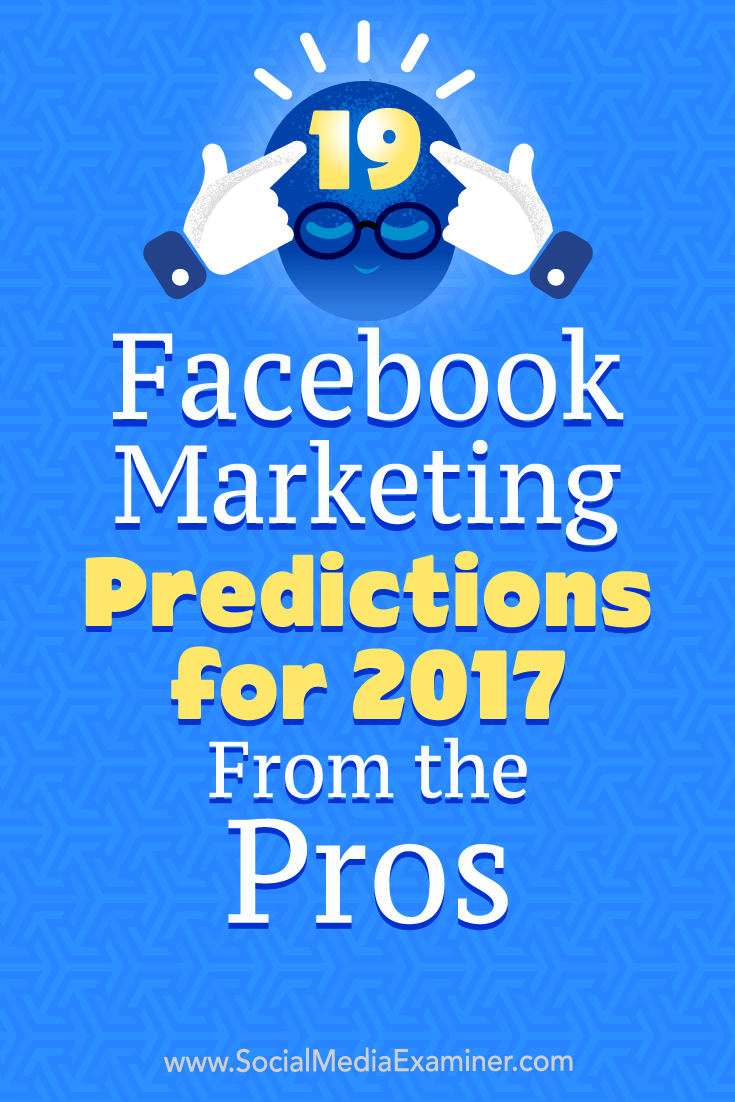
Attention Agency Owners, Brand Marketers, and Consultants

Introducing the Marketing Agency Show–our newest podcast designed to explore the struggles of agency marketers.
Join show host and agency owner, Brooke Sellas, as she interviews agency marketers and digs deep into their biggest challenges. Explore topics like navigating rough economic times, leveraging AI, service diversification, client acquisition, and much more.
Just pull up your favorite podcast app, search for Marketing Agency Show and start listening. Or click the button below for more information.


